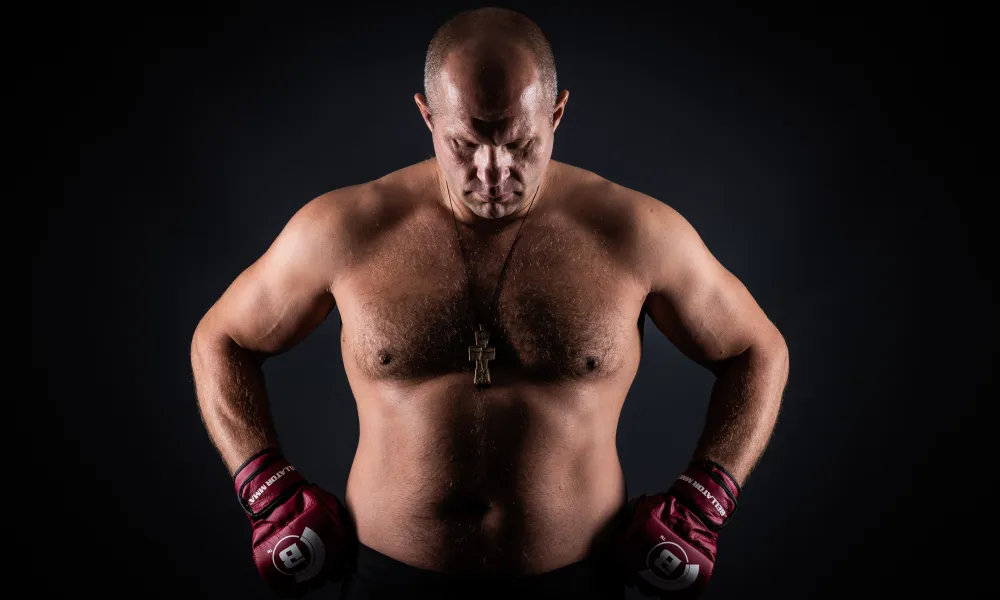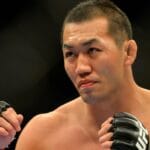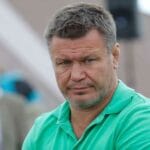The Rise of a Legend
Let’s journey into the captivating world of Fedor Emelianenko, a name synonymous with greatness in mixed martial arts (MMA). Born on September 28, 1976, in Rubizhne, Ukraine, Emelianenko’s path to becoming “The Last Emperor” is as compelling as his dominance in the ring.
Even as a child, Emelianenko immersed himself in the disciplined worlds of Sambo and Judo, Honing his skills and shaping his character, these martial arts instilled in him the values of respect, mastery, and an unyielding drive for self-improvement. This foundation set the stage for his meteoric rise in MMA.
Emelianenko’s professional MMA debut in 2000 sent ripples through the fighting world. His victories weren’t just wins; they were masterclasses in controlled aggression and technical brilliance. By 2002, he joined PRIDE, a premier MMA organization, and quickly ascended to become the Heavyweight Champion in 2003.
During his reign in PRIDE, Emelianenko achieved a legendary undefeated streak of 28 victories, defeating some of the most recognizable names in the sport, including Antonio Rodrigo Nogueira and Mirko “Cro Cop” Filipovic. His dominance wasn’t confined to a single organization. Even after PRIDE, he continued to captivate audiences worldwide, becoming a global icon revered for his fighting prowess and his quiet, dignified demeanor.
Deconstructing the “Last Emperor’s” Fighting Style
Emelianenko wasn’t known for flamboyant entrances or trash talk. He entered the ring with a stoic expression, radiating an aura of quiet intensity and unwavering respect for his opponents. However, when the bell rang, he transformed into a force of nature.
His fighting style was a mesmerizing blend of Sambo, Judo, and Boxing, seamlessly woven into a potent and unpredictable form of combat. Emelianenko was feared for his devastating ground-and-pound, often finishing fights with a relentless barrage of strikes that left opponents reeling. His ability to control the pace and dictate the fight’s location, transitioning effortlessly from striking to grappling, made him a puzzle that few could solve.
Fedor Emelianenko’s Fight Record: A Testament to Greatness
Emelianenko’s career is etched in the annals of MMA history with an astounding 39 victories. This record, however, only tells part of the story. He achieved these victories against some of the toughest competitors in the world, during an era considered by many to be MMA’s golden age.
- Total Fights: 46
- Wins: 39
- Losses: 6
- No Contests: 1
His victories include triumphs over four former UFC champions, a testament to the elite level of competition he consistently faced and conquered. This period of dominance solidified his place in the pantheon of MMA legends.
Unraveling the Legend: How Many Years Was Fedor Emelianenko Undefeated?
From March 2003 to June 2010, Emelianenko was an unstoppable force, achieving a 28-fight win streak that remains the longest in the history of men’s MMA. This period, spanning over seven years, showcases his unparalleled dominance and his ability to consistently perform at the highest level.
It’s important to note that Emelianenko’s official record includes a controversial loss in 2000 against Tsuyoshi Kohsaka. The fight was stopped due to a cut sustained by Emelianenko from an illegal elbow strike, leading many fans and experts to argue that the loss should be overturned. If this were the case, his undefeated streak would extend to an astounding 29 fights, further cementing his legendary status.
Is Fedor Emelianenko the Best Heavyweight Ever?
The debate surrounding the greatest heavyweight fighter of all time continues to rage, and Emelianenko’s name is always at the forefront of the conversation.
Arguments for Emelianenko:
- Unmatched Prime: His dominance during the PRIDE era, considered by many to be a more competitive landscape than the UFC at the time, is a powerful argument in his favor.
- Aura of Invincibility: Emelianenko possessed a rare aura of invincibility, striking fear and respect into his opponents. This psychological edge, coupled with his physical prowess, made him a formidable challenge.
- Well-Rounded Skillset: He was the complete package, equally adept at striking and grappling, with fight-ending power in both hands and a relentless pace that overwhelmed his opponents.
Counterarguments and Other Contenders:
- Lack of UFC Success: Some argue that Emelianenko’s absence from the UFC during his prime diminishes his claim to the title. They point to the fact that he didn’t compete against some of the UFC’s top heavyweights during that era.
- Later Career Losses: While understandable given his age and the evolution of the sport, Emelianenko’s losses in the latter part of his career are sometimes cited as evidence against his claim as the GOAT.
- Other Heavyweight Greats: Fighters like Stipe Miocic, with his multiple UFC Heavyweight Championship reigns, and Cain Velasquez, known for his incredible cardio and relentless pressure, are often mentioned as contenders for the title of Heavyweight GOAT.
The Verdict: The debate is ultimately subjective. While other fighters have achieved great things, Emelianenko’s dominance during his prime, his unique fighting style, and his enduring impact on the sport solidify his place as one of, if not the, greatest heavyweight fighters of all time.
A Powerful Endorsement: John McCarthy, a legendary MMA referee, and commentator, summed it up best: “There is no doubt Fedor is the greatest heavyweight of all time.”
Why Did Fedor Emelianenko Retire?
In 2023, after an illustrious career spanning over two decades, Fedor Emelianenko decided to retire. The decision, made at 46 years old, was driven by a confluence of factors.
- Physical Toll: MMA, especially in the heavyweight division, is incredibly demanding. The cumulative effect of years of training and fighting inevitably takes its toll, even on the most resilient athletes. Emelianenko acknowledged this, suggesting that the physical demands of the sport influenced his decision.
- Retiring on Top: Emelianenko always emphasized his desire to retire on his own terms, not wanting to be forced out by declining skills or a string of losses. His decision to retire while still capable of competing at a high level underscores his self-awareness and his desire to maintain control of his own narrative.
- Final Challenge: Emelianenko’s last fight was a rematch against Ryan Bader, the man who had defeated him in 2019. This final challenge, a chance to avenge a loss and end his career on the grand stage, held special significance.
Life Beyond the Ring: Fedor Emelianenko’s Enduring Legacy
Even in retirement, Emelianenko’s influence on MMA continues to be felt. He currently serves as the Honorary President of the Russian MMA Union, dedicating himself to nurturing the sport’s growth in his home country. He’s also a vocal advocate for MMA, using his platform to promote its positive values and inspire the next generation of fighters.
Emelianenko’s impact transcends wins and losses. He inspired countless fighters with his unique skill set, his quiet confidence, and his unwavering dedication to his craft. He demonstrated that true strength comes from within, cementing his legacy as a true icon of MMA.
Explore Further:
- Discover mind blowing facts about Jean Paul Sartre that will leave you in awe of his philosophical prowess.
- Uncover facts about Aileen Cannon and delve into the life of a prominent jurist whose rulings have shaped the legal landscape.
- Immerse yourself in facts about Louis Armstrong, a legendary musician whose trumpet melodies continue to captivate audiences worldwide.
- Unlock Elemental 2 Secrets: Actionable Insights Now - April 2, 2025
- Lot’s Wife’s Name: Unveiling the Mystery of Sodom’s Fall - April 2, 2025
- Photocell Sensors: A Complete Guide for Selection and Implementation - April 2, 2025
















